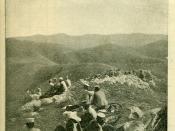NOTE: This professor is a bit eccentric, and wanted this essay in a letter format, as if I were a Command & Staff Officer assigned to report on the performance of the Czar's (Russian) Imperial Army during the Russo-Japanese War of 1904.
Letter Begins:
Your Excellency,
As the ripples of the Japanese affair finally diminish I humbly submit that your Imperial Army is in dire need of restructuring--some of which has already had the foundation established but was unable to achieve full potential due to the outbreak of war.
First, let us discuss the many weaknesses that plagued the army in Asia. The single most influential, or more properly, the lack thereof, was our senior leadership. The complete indecisiveness of Kuropatkin, as first appeared in the maneuver exercise of 1902, must bear the brunt of "what went wrong"; however, this is just one of the roots that helped grow the tree of failure.
Kuropatkin's poor leadership also fanned the problems that could be found in the Leer teachings, in which our generals were still attempting to utilize a Napoleonic strategy against an unpredictable enemy armed with today's most modern weapons. Additionally, Kuropatkin was surrounded by a senior staff that was both, too old for the rigors of combat, and as demonstrated, incompetent--a staff that Kuropatkin failed to relieve or request the replacement of. One final note on leadership: the obvious stubbornness for the naval and army senior commands to coordinate and/or agree with a course of action proved fatal, especially when Port Arthur was for all intents and purposes, the key to our victory in the Far East.
Further, following our military history, the problem of logistics and mobilization again substantiates the need for reforms. The reliance on the single Trans-Siberian railroad to both logistically support (especially once...



Yes, this professor is very excentric
nice job filling the format though
3 out of 3 people found this comment useful.